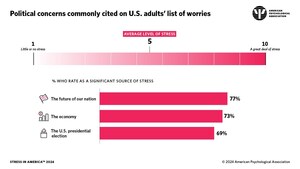Many Americans Stressed about Future of Our Nation, New APA Stress in America™ Survey Reveals
Poll shows more Americans reporting symptoms of stress and citing personal safety and terrorism as sources of stress
WASHINGTON, Feb. 15, 2017 /PRNewswire-USNewswire/ -- Two-thirds of Americans say they are stressed about the future of our nation, including a majority of both Democrats and Republicans, according to the American Psychological Association's (APA) report Stress in America™: Coping with Change.
More than half of Americans (57 percent) say the current political climate is a very or somewhat significant source of stress, and nearly half (49 percent) say the same about the outcome of the election, according to an APA poll conducted in January.
While Democrats were more likely than Republicans (72 percent vs. 26 percent) to report the outcome of the 2016 presidential election as a significant source of stress, a majority of Republicans (59 percent) said the future of the nation was a significant source of stress for them, compared with 76 percent of Democrats.
"The stress we're seeing around political issues is deeply concerning, because it's hard for Americans to get away from it," said Katherine C. Nordal, PhD, APA's executive director for professional practice. "We're surrounded by conversations, news and social media that constantly remind us of the issues that are stressing us the most."
Nordal also noted that while APA is seeing continued stress around politics, the survey also showed an increased number of people reporting that acts of terrorism, police violence toward minorities and personal safety are adding to their stress levels.
These results come on the heels of APA survey results released last fall that found 52 percent of Americans reported that the presidential election was a significant source of stress. That survey was conducted online in August 2016 among 3,511 adults 18+ living in the U.S. by Harris Poll on behalf of the APA. To better understand these political stressors and assess potential long-term effects, APA commissioned an additional survey, conducted online by Harris Poll in early January 2017, among 1,019 adults ages 18+ who reside in the U.S., asking adults once again to rate the sources of their stress, including the political climate, the future of our nation and the outcome of the 2016 U.S. presidential election.
Between August 2016 and January 2017, the overall average reported stress level of Americans rose from 4.8 to 5.1, on a scale where 1 means little or no stress and 10 means a great deal of stress, according to the APA survey. This represents the first significant increase in the 10 years since the Stress in America survey began. At the same time, more Americans said that they experienced physical and emotional symptoms of stress in the prior month, health symptoms that the APA warns could have long-term consequences.
APA's January survey showed the percentage of Americans reporting acts of terrorism as a very or somewhat significant source of stress increased from 51 percent to 59 percent from August 2016 to January 2017. Additionally, the percentage reporting police violence toward minorities as a very or somewhat significant source of stress increased from 36 percent to 44 percent during the same period. Since August, the percentage of Americans saying personal safety is a very or somewhat significant source of stress increased from 29 percent to 34 percent—the highest percentage noted since the question was first asked in 2008.
Reported stress varied by education, with 53 percent of those with more than a high school education reporting very or somewhat significant stress related to the election outcome, compared to 38 percent of those with a high school education or less. Additionally, a greater percentage of Americans who reside in urban areas said the same (62 percent), compared with those who live in suburban (45 percent) and rural (33 percent) areas.
These additional stressors may be affecting Americans' health. The percentage of people reporting at least one health symptom because of stress rose from 71 percent to 80 percent over five months. A third of Americans have reported specific symptoms such as headaches (34 percent), feeling overwhelmed (33 percent), feeling nervous or anxious (33 percent) or feeling depressed or sad (32 percent).
"While these common health symptoms might seem minor, they can lead to negative effects on daily life and overall physical health when they continue over a long period," said Nordal.
APA encourages people to stay informed but know their own limits when it comes to taking in information as one way to diminish the constant exposure to potentially distressing information and the resulting physical symptoms.
"For many, the transition of power and the speed of change can cause uncertainty and feelings of stress, and that stress can have health consequences. If the 24-hour news cycle is causing you stress, limit your media consumption," said Nordal. "Read enough to stay informed but then plan activities that give you a regular break from the issues and the stress they might cause. And remember to take care of yourself and pay attention to other areas of your life."
This marks the 10-year anniversary of the Stress in America report, part one of a two-part release. APA will release part two on Feb. 23, highlighting how technology use affects stress among Americans.
To read the full Stress in America report or to download graphics, visit http://www.stressinamerica.org
For additional information on stress, lifestyle and behaviors, visit www.apa.org/helpcenter. Join the conversation about stress on Twitter by following @APAHelpCenter and #stressAPA.
Methodology
The Stress in America™ survey was conducted online within the United States by Harris Poll on behalf of APA between Aug. 5 and 31, 2016, among 3,511 adults ages 18+ who reside in the U.S. Surveys were conducted in English and Spanish. APA commissioned Harris Poll to conduct an additional survey online within the United States between Jan. 5 and 19, among 1,019 adults ages 18+ who reside in the U.S. Surveys were conducted in English and Spanish. Data were weighted to reflect their proportions in the population. Weighting variables included age, gender, race/ethnicity, education, region and household income. Propensity score weighting also was used to adjust for respondents' propensity to be online. Hispanic respondents were weighted for acculturation, taking into account respondents' household language as well as ability to read and speak in English and Spanish. Because the sample is based on those who were invited and agreed to participate in the Harris Poll online research panel, no estimates of theoretical sampling error can be calculated. A full methodology is available upon request.
The American Psychological Association, in Washington, D.C., is the largest scientific and professional organization representing psychology in the United States. APA's membership includes more than 115,700 researchers, educators, clinicians, consultants and students. Through its divisions in 54 subfields of psychology and affiliations with 60 state, territorial and Canadian provincial associations, APA works to advance the creation, communication and application of psychological knowledge to benefit society and improve people's lives.
SOURCE American Psychological Association
Related Links
WANT YOUR COMPANY'S NEWS FEATURED ON PRNEWSWIRE.COM?
Newsrooms &
Influencers
Digital Media
Outlets
Journalists
Opted In






Share this article